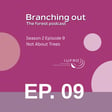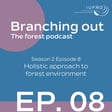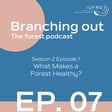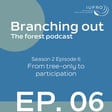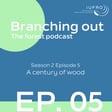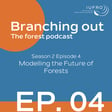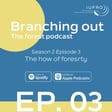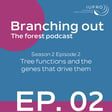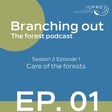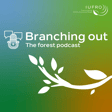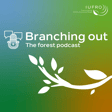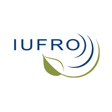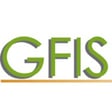Become a Creator today!Start creating today - Share your story with the world!
Start for free
00:00:00
00:00:01

Episode 1: IUFRO World Congress 2024, a new chance to meet
Branching out: the forest podcast first episode with Elena Paoletti, Fredrik Ingemarson, John Parrotta and Sarah Burns chatting about what you can expect from the IUFRO World Congress 2024 in Stockholm, Sweden. Hosted by Jose Bolaños (IUFRO HQ) and featuring Jennifer Hayes, US Forest Service. Do not miss it and share the podcast with your friends and colleagues.
Transcript
Podcast Introduction
00:00:03
Speaker
Can you imagine a global network of forest scientists that has existed for more than 130 years? Imagine what they've seen, what they've accomplished.
00:00:18
Speaker
Welcome to our very first branching out the forest podcast where we connect forests, science and people. We aim to break down complex topics so that you can discover the role of forests and trees for people and nature and also inform you about what's going on in the world of forest research.
Focus on IUFRO World Congress 2024
00:00:34
Speaker
This podcast is brought to you by the International Union of Forest Research Organizations, IUFRO. And we will dedicate this first season to IUFRO's World Congress 2024 in Esto Call. I am Jose Volanez from the IUFRO headquarters and with me is Jennifer Hayes from the U.S. Forest Service. Hello Jennifer.
00:00:50
Speaker
Hi, thanks, Jose. In today's episode, we're going to discuss the Congress theme, forests and society towards 2050 with some very special guests. So I hope you're going to stay with us, especially if you want to learn more about what is happening in Stockholm, Sweden and the Nordic Baltic region in June of 2024 and how you can participate.
00:01:11
Speaker
But before we start, some of you may be wondering what Ayufro, the international union for a research organization, is. Think of it like a huge tree with roots standing throughout the whole world. So today, the network connects around 630 different organizations in 115 countries. That's about
00:01:32
Speaker
15,000 forest scientists committed to work on topics like forest health, sustainable management, biodiversity, climate change, policy and much more.
00:01:42
Speaker
I, like many of you I expect, am bombarded by news about global warming, forest fires, biodiversity loss. I'm thinking regularly about how these things impact our lives, impact my life. These types of world events are integral to the program of the 2024 IU for a World Congress because it focuses on looking forward to the year of 2050 and the roles that forests play in our society.
00:02:06
Speaker
Joining us today for a bit of a forest walk is Elena Paoletti, Chair of the Congress Scientific Committee, and we ask her why the Scientific Committee has chosen this important theme.
Forests and the UN 2030 Agenda
00:02:19
Speaker
We decided to focus on forest contribution to the United Nation 2030 agenda and its sustainable development goals because obviously demands of forest ecosystem services are arising due to the climate crisis.
00:02:35
Speaker
the need to reinforce the bioeconomy and the increasing demand for societal services of the healthy forest and for forest resilience to disturbances and other anthropogenic pressures. So you know that we selected the year 2050 as ideal deadline because 2050 is a landmark
00:03:01
Speaker
year to achieve the vision of living in harmony with nature of the conventional biological diversity as well as the target of net zero emissions. And Elena, what other topics can we look for during the Congress? Can you tell me maybe for example how global perspectives are included? We have five themes in the scientific program.
00:03:25
Speaker
The first theme is about strengthening forest resilience and adaptation to stress. Recent developments indicate that the effects of climate change are threatening forest health globally and locally, with increasing fire frequency and extreme climatic events that affect the forest-soil-water nexus, with increasing damage by pest and pathogens, including allium and invasive species,
00:03:54
Speaker
with increasing risk by air pollution and novel contaminants, think about microplastics. With our theme too, we aim to go towards a responsible forest by economy. Sustainability and responsibility nowadays are two interlinked concepts. Within this theme, we'll discuss innovation markets, industrial developments for the first products, the entire supply chain and value networks, and the critical, very critical example
00:04:23
Speaker
is forest biomass used for energy production. Our theme three actually is about forest biodiversity, which is the foundation of many ecosystem services and the key for the future of our planet.
00:04:38
Speaker
Biodiversity is under unprecedented threat, driven largely by habitat loss. We have a lot of interest in the Congress for Sustainable Societies, which is our theme four, where we focus on the major challenges to society and, of course, the feedbacks with forests.
00:04:57
Speaker
starting from nature-based solutions as a win-win strategy for addressing the two big global challenges of climate change and biodiversity loss. The Congress would like to favor a just transition to low-carbon, nature-based and resilient economy as a prerequisite for sustainable societies. To leave no one behind is one of the pillars of the United Nations 2030 agenda.
00:05:27
Speaker
and we move to the future. The future of forests and the forests for our future, which is the subject of our theme five, where we will talk about innovation. Innovation in forest research and emerging methodologies such as forestry, 4.0, certification schemes, developments in remote sensing, in manipulative research, precision forestry, procurement systems,
00:05:55
Speaker
IT applications and of course modeling, because robust projections with clear uncertainties are at the core of our understanding of the future of our forests.
00:06:06
Speaker
So there you have it folks, the five themes of the Congress. Strengthening forest resilience and adaptation to stress towards a responsible forest bioeconomy, forest biodiversity and its ecosystem services, forests for sustainable societies, and forests for the future. Hey, Jose, where can people go to get more information on
Congress Structure and Participation
00:06:26
Speaker
these themes?
00:06:26
Speaker
That's an easy one. There is more information on the Congress website at ufro2024.com and it is indeed a very dense program. Elena, what can we expect in terms of the structure of the sessions? We have five days of scientific sessions. Each day we'll have one plenary session on one of our five themes with one keynote scientific speech and one keynote stakeholder speech. And each day we'll have also one hour-long subplanetary
00:06:56
Speaker
sessions on more general subjects and 25 parallel, two-hour-long technical sessions for a total of 25 subplanary and 175 technical sessions. The call of apps director is open from February to June 2023.
00:07:16
Speaker
In addition to the traditional talks, we aim at welcoming 2,000 poster presentations in the form of shorter talks, flasher talks. Keep in mind, everyone, that the call for abstracts is open and you can submit yours now. You can do that at ufro2024.com. Thank you so very much, Elena, for your inputs and your thoughts. Listeners, let's go ahead and switch gears now and talk with Frederick Ingmarsson and back to Jose regarding the practical details of the Congress.
Nordic and Baltic Hosts
00:07:47
Speaker
Well, in Norse mythology, the three of life stands in the middle of the world with branches that stretch out all over the nine realms. We like the metaphor. When we talk about Ayufro and how the members are spread across the world, well, we actually bring them every four to five years in a single place.
00:08:05
Speaker
our Eufro Tree of Life. And with this in mind, we now arrive in Northern Europe, Estoucon, Sweden, where we will learn more about the host of Eufro World Congress 2024. Many of the countries of the Nordic and Baltic region have large forest covers and a long tradition in forest management. The forest sector is important for regional development and plays a crucial role in employment in rural areas.
00:08:32
Speaker
Let's hear about it from Fredrik Ingermalsen, the chair of the Congress Organizing Committee. The Nordic and Baltic countries are active in and support international research cooperation and also stress the importance of aid and exchange of knowledge. IUFRA is by far the largest organization in forest research cooperation and a strong platform for major joint research and innovation programs. And the IUFRA Congress provides a unique
00:08:59
Speaker
opportunity to present the rich and diverse forest landscapes of the Nordic and Baltic countries. And of course, we're going to use this opportunity. And this include world-leading research, innovations, stakeholders and a vast variety of cultures, of course. There are activities happening even before the actual Congress starts, such as excursions. Fredrik, can you tell us a little bit more about them?
Pre-Congress Excursions
00:09:22
Speaker
In Iceland, we have, for example, the highlands of Iceland and the glaciers of Iceland.
00:09:27
Speaker
And in the heart of the boreal forest, you travel between the north of Sweden and the north of Finland. And then we have from coast to coast, you travel along the rivers between Sweden and Norway, and Voyage to the fjords as well.
00:09:43
Speaker
is also another excursion going from Sweden to Oslo in Norway between the capitals. Under the Midnight Sun is of course another one that we really look forward to invite the delegates to join the northern part of Sweden and Finland and look at arts and fantastic views in the national parks and so on.
00:10:03
Speaker
And then, of course, the Sandy Peninsula and the Baltic Sea is one excursion that we believe will be truly interesting, where you travel between the three countries of the Baltic States. Yes, we also asked Eric who we can expect to come apart from the scientists. Yes, here we expect a wide range of stakeholders, and this is typical for this part of Europe, the northern part, with so many different stakeholders involved in forestry.
00:10:29
Speaker
And we can start off with business. And here we talk about forest industry, for example, family foresters, do-it-yourself chains, furniture industry, green tech companies, architects, of course, are important, and touristic organizations, etc. And non-profit organizations, of course, we aim for to have them there. Of course, we have small and larger NGOs that we would like to see at the Congress, investors and foundations, of course, and outdoor organizations.
00:10:58
Speaker
And then we have authorities working on forests and climate and environment, of course, that will be there. Regional ministers, but we'll also invite other governmental representatives and ministers from all over the world for the Congress 2024.
Innovative Forest Solutions
00:11:12
Speaker
And what can we look for in terms of innovation during the Congress? There will be a lot of interesting cases to look at during the Congress in Stockholm. We will showcase decisive technical solutions for the future in forest management and product development.
00:11:28
Speaker
at the exhibition. And the excursions as well, they will include innovative solutions when it comes to products, management systems and dialogues between researchers and stakeholders.
00:11:38
Speaker
And we talk about the Congress Week itself, but the bilateral meetings are as important as the Congress to find new partners and to co-create and find new solutions. And how will you, through the Swedish University of Agriculture and Science, SLU, promote equal opportunities during the EU for World Congress 2024? SLU is also the Inuit Theatre
00:12:01
Speaker
of a declaration of intent for an equal green sector with a goal that the green sector should be a place of work and study where everyone feel included and safe. We consider this as a guideline and also our action plan to follow and will shortly start to work to adapt this declaration to the specific Congress conditions.
Green Initiatives for Congress
00:12:23
Speaker
And the question that is on everybody's mind, how about the carbon footprint of the Congress?
00:12:29
Speaker
Stockholm is recognized as one of the most sustainable capital in the world. The Congress will have a green travel policy. The goal is to influence people's behavior and attitudes towards environmental-friendly travel, and for the Congress organizing committee to choose certified suppliers for the Congress and excursions.
00:12:48
Speaker
The overall purpose and goals for the green travel policy will be a package of actions to guide the delegates and suppliers to more efficient and environmentally friendly alternatives. Some examples are that we will include public transportation card in the registration fee. We have pre-booked hotels that actively work towards sustainability and to take social responsibility.
00:13:11
Speaker
And although the focus is on a physical meeting, which is traditional to Ayufro, where people get inspired and establish new relations, including all cultural aspects of the host, there will be a chance to register for live streaming. This only includes the main hall for keynotes and panel discussions.
00:13:29
Speaker
And if you are a forest scientist from an economically disadvantaged country in Africa, Asia, or Latin America, a UFO special program for development capacities will provide some financial assistance to participate in the Congress through its scientific assistance program. If you have submitted an abstract and it gets approved, you may apply for these funds starting from 1st of November, 2023. There is more information on the website at ufro2024.com, including the full interview with FEREC, which will be available soon.
00:13:58
Speaker
And now back to Jen for a very special history lesson with our next guest.
Historical Growth of IUFRO Congresses
00:14:03
Speaker
Wow, Jose and Frederick and Elena, we have covered a lot of ground in this podcast so far. And I guess that's natural as this is a global network and it's incredibly complex. I am really excited for this next interview because it's with my dear friend and colleague, John Perrata. He is currently the IUPRO president and he is here with us to take us on a short time travel to previous Congresses. John, how about a history lesson?
00:14:31
Speaker
Well, UFO goes back many, many years. A year after it was established in 1892, the first Congress was held in Vienna, the beautiful city of Vienna, in 1893. It was not a very large Congress. I think there were about 18 participants coming from five countries, from Austria, Germany, Hungary, Italy, and Switzerland. It was a very small gathering, but it was a very historic event.
00:14:57
Speaker
Coincidentally, Vienna, Austria has been the host of the IU First Secretariat for the past 50 years. Congresses have been held all over the world, but the first, I think, 14 or 15 were in Europe. And it wasn't until the Congress in 1971 that we left Europe and had First Congress outside of the region in Gainesville, Florida. That was in 1971.
00:15:21
Speaker
But after that, we became truly international in our selection of Congress venues and hosts. Two Congresses later, we had the Congress in Kyoto, Japan, and then after that, other international non-European venues included first Congress in the tropics in 2000, and that was in Kuala Lumpur, in Malaysia. And the next one was in Brisbane, Australia, and then the one after that in Seoul, South Korea, and of course, Curitiba, just three and a half years ago.
00:15:50
Speaker
So we're becoming much more international. The Congresses are becoming larger and larger. Prove from an attendance of 18 back in 1893 to well over 3,000 participants for the last three Congresses. So John, can you tell me a little bit about your initial involvement with IU FRO and your first World Congress? The most memorable was probably my first one.
00:16:10
Speaker
And I think that's probably true for a lot of people. And that, as I mentioned earlier, was in Tampere in Finland. And that was back in 1995. So it was my first Congress. It was the first time I was in a conference with so many people from so many disciplines and countries. I don't recall how many countries were represented there, but it must have been at least 75.
00:16:32
Speaker
because the most recent ones have had approximately 100 countries represented among his delegates. But, you know, it was a special event. It was a summer in Finland. It wasn't much darkness throughout the week, and consequently not much sleep. And on top of that, it was a fun place to be. I had no idea there was so much nightlife that far north. And who knew that there were salsa clubs and karaoke bars.
00:16:59
Speaker
And so I frequented quite a few of those, made me late for some of the events early in the mornings, but it was a blast. I had a great time, met a lot of new people, had fun, learned a lot, enjoyed the fantastic hospitality of our Finnish hosts. And I think that's the kind of thing that really sticks with you.
00:17:16
Speaker
So John, can you help me paint an image in my mind of who attends these congresses? It's a real mix. I mean, it's predominantly far scientists and they can come from research institutes, universities. This includes a lot of students, you know, and I think over the years we're seeing more and more students, undergraduate and postgraduate students, come joining the congress because we're providing more opportunities for young scientists to present their work. So it's predominantly people who are involved in far scientists. We also include a lot of our stakeholders.
00:17:45
Speaker
decision makers at all levels, forest managers and representatives of communities and as well as forest policy makers. This is a good mix of delegates and gives us an opportunity to exchange perspectives between the scientific community and those who we hope our science is serving. Okay, but what does that mean for IUFRO, for the network? What's the IUFRO World Congress in 2024's role in responding to these global challenges?
Addressing Global Challenges
00:18:14
Speaker
We're living in very challenging times with some huge problems that face us in terms of environment, economy, politics, social issues. I mean, there's all sorts of major, major challenges facing the world. And this Congress will focus on how forests and forest science can help respond to these challenges, not just in the forest sector, but more broadly. And the theme of the Congress relates to the agenda for sustainable development and the sustainable development goals.
00:18:42
Speaker
And these relate not just to forests and the environment, but also to some other key issues such as food security, water resources, poverty, and a number of others that are crucial for the future of mankind, without exaggeration. And forests have a role in addressing many of these issues. And I think the Congress is going to highlight where we fit in as forest scientists, as the global forest science community. So I think it's crucially important.
00:19:08
Speaker
Wow, what a history lesson now. And finally, one of the most awaited events at the War Congress is probably the presentation of the Scientific Awards. And to tell you small about this, here's a very special person, Sarah Burns, an early career researcher from Argentina, who leads the international forest governance and the multilateralism research group at the Technical University of Dresden, Germany.
00:19:31
Speaker
So tell us, Sara, when you attended the World Congress in Curitilla back in 2019, what were your expectations? And of course, you received the Youth Through Outstanding Doctoral Research Award. And what did this award mean to you?
00:19:44
Speaker
It was an honor to get such an award to be selected among many PhDs. This also opened me the opportunity to be more involved with IUFRO. So after this conference in Curitiba, I was appointed Deputy Coordinator of IUFRO Unit 9.5 on Forest Policy and Governance.
00:20:07
Speaker
and also a coordinator of IUFRO unit 9.5.8 on forest and natural resources and governance in Latin America and the Caribbean. It gives you some visibility within the IUFRO networks and this opens more research opportunities and collaboration opportunities here.
00:20:25
Speaker
I was invited after the award to be a mentor of a restoration steward by the Global Landscape Forum with a project on forest restoration in Argentina in the Espinal region, which is maybe not the region that is not the Amazon, so it doesn't have a lot of attention, but it's actually one of the regions with more pressure for land use change in Argentina.
00:20:50
Speaker
completely surrounded by soil production, for example. So by being able to mentor this project, I could also participate a little bit in this. Being involved in IUFRO, I was also invited to a press briefing that was organized before the conference of the parties, number 26. So from the Climate Change Convention, where the aim was to inform the global media on imported deforestation. So there I was able to join
00:21:18
Speaker
other very renowned researchers on the topic and being able also to present to the media, which as a researcher is not always an opportunity we get. These opportunities, let's say, were open to me after receiving this award. Thank you, Sarah. That was very, very interesting to hear what you've accomplished after you received the award.
00:21:37
Speaker
For everybody the nomination for this awards is open until may fifteen and for more information you already know what i'm gonna say everything is on the website so you for twenty twenty four dot com back to you then thanks jose wow this has been just a really fun episode to be a part of.
00:21:54
Speaker
When I think about all the things we've covered, we've explored the many roots of the tree that is the IUPRO network. We've heard about what we can expect in Stockholm in 2024 at the Congress, explored the main themes, got a glimpse of some of the interesting activities and awards and other things we can look forward to. I guess for me, I feel inspired and I hope it's inspired our listeners out there to want to join us at the Congress in Stockholm and learn more about what I consider to be the very exciting world of forest research.
00:22:22
Speaker
And hopefully you do, too. Minds saying thoughts. And thank you, Jen, and to our guests as well, and obviously to our listeners. Just to wrap it up, look out for our next branching out in this summer, where we will explore the topic of spreading forest resilience and adaptation to stress. If you want to know more about a UFO, follow our social media or click on the link below, you know, right where the show notes are. We now leave you with this takeaway message from John. Until next time. All right, fantastic.
00:22:51
Speaker
The years leading up to the 2024 Congress have been very challenging for all of us. And I believe, you know, it's been difficult to maintain our connectivity and our enthusiasm in some cases. And I think this Congress is going to be a real celebration. A chance for us to reestablish connections, to expand our horizons and to build the kind of solidarity and friendship that characterizes UFO and is what's needed in these times to solve so many of the problems that we have related for us and more broadly in society.
00:23:21
Speaker
you
